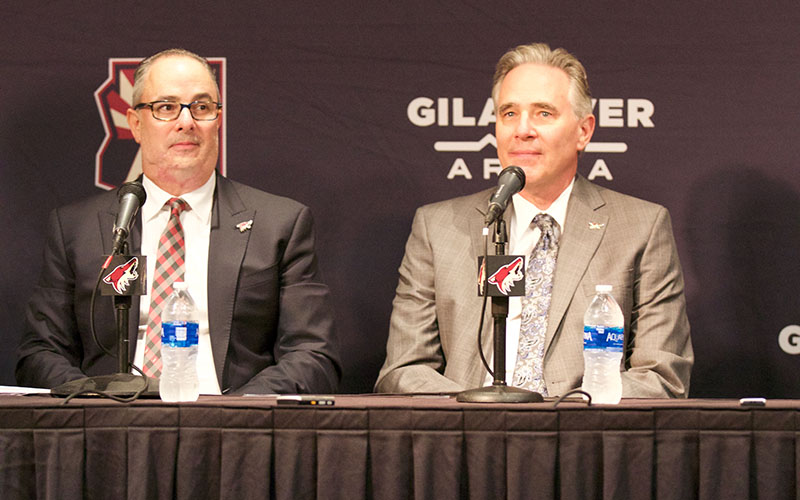
Coyotes owner Andrew Barroway (left) and new President and CEO Steve Patterson address the media Thursday at Gila River Arena. (Photo by John Arlia/Cronkite News)
GLENDALE — In his first public appearance since becoming the sole owner of the Arizona Coyotes, Andrew Barroway insisted that the franchise’s top priority is to find a new, long-term home in Arizona.
“We couldn’t be more committed to Arizona and the Valley,” said Barroway, who completed a buyout of the team’s minority owners in June, on Thursday. “The biggest project at hand is to find a home in the right place for the Coyotes in Arizona.”
Barroway has handed that responsibility to former Arizona State athletic director Steve Patterson, who was introduced alongside head coach Rick Tocchet as the Coyotes’ new president and CEO.
Patterson will fill the void left by Anthony LeBlanc, who resigned from the same positions just days after Barroway completed his takeover. The 59-year-old will try to put an end to the Coyotes’ ongoing stadium saga, which began in 2015 when the city of Glendale voted to cancel its 15-year, $225 million arena lease agreement with the team.
Since then, Phoenix Mayor Greg Stanton tried to lure the team to downtown Phoenix in April 2016 when he discussed building a joint-use stadium to be shared by the Coyotes, Phoenix Suns and Phoenix Mercury. ASU has also entered discussions with the Coyotes about bringing the team to Tempe, but the school pulled out of the deal in February after four months of negotiations.
Barroway believes that Patterson’s expertise in stadium development and his history of working in the Valley make him a perfect fit to lead the project and finally put the team’s lingering arena drama to rest.
“He previously worked in our market and has the necessary corporate and political relationships to help us secure a long-term home for the Coyotes in the Valley,” Barroway said. “We’re thrilled to have him join us.”
Patterson is the president of Pro Sports Consulting, a company that provides services to clients that operate or seek to acquire professional sports properties. Pro Sports Consulting specializes in designing, financing, building and operating sports facilities and has recently worked with the Pittsburgh Penguins, Los Angeles Clippers and ASU among others.
In his time as ASU’s athletic director, Patterson headed the development and operation of the school’s 425-acre Sports Facilities District in downtown Tempe and facilitated the golf team’s move to Papago Golf Course.
Patterson expressed his excitement to return home to the Valley and continue to develop the relationship between the Coyotes and the Phoenix community.
“We and everybody associated here with this franchise are committed to a great, long-term future in the Valley,” Patterson said. “I wouldn’t have come back here if that wasn’t Andy’s vision and what we’re trying to create here in this community in the Valley on a whole.”
In addition to having led the athletic departments at ASU and the University of Texas, Patterson also has a history of working for professional teams. He played an influential role in leading the NFL’s expansion to Houston, an experience that taught him any deal can be completed, no matter how often it seems to be falling apart.
Patterson reminisced about his initial disappointment when the NFL stalled on Houston’s NFL bid in order to give Los Angeles six months to figure out their proposal. Five and a half months later after L.A. hadn’t made significant progress, Patterson said he was back in former commissioner Paul Tagliabue’s office putting a deal together.
After getting the league’s approval, Patterson was responsible for the successful design, finance and construction of Reliant (now NRG) Stadium, marking the first time in NFL history that a project of that size was completed on-time and within budget.
“These deals are like vampire movies,” Patterson said. “It’s got to go in the grave half a dozen times to come back out hopefully seven times.”
That analogy fits the Coyotes’ stadium saga perfectly.
When pressed on whether his history with ASU could help bring an ASU-Coyotes deal back from the dead, Patterson said it was too early to speculate on any particular stadium site, but that the team was pursuing any and all options.
“We’re willing to talk to anybody in the Valley to make sure that we have a successful arena solution that provides stability for the franchise and the resources to support the hockey operation,” Patterson said.
With the team’s current lease at Gila River Arena set to expire at the end of the 2017-18 season, Barroway said that he and Patterson would be leading an aggressive pursuit of a new home. Barroway would not speculate on the team’s interest in extending its stay in Glendale if necessary, but left little doubt over where the Coyotes would play for the foreseeable future.
“There’s no definite timeline,” Barroway said. “I can tell you that failure is not an option. We’re going to get a new stadium here, it’s just a question of when.”
Barroway insisted that the NHL is still very committed to keeping the Coyotes in Arizona and said that commissioner Gary Bettman spends more time working with his franchise than any other team in the league.
“The commissioner of the league is very, very committed to Arizona and has helped us in numerous ways,” Barroway said. “They’ve (Bettman and the NHL) been a big asset to us and they’re anxious for us to get a long-term stadium solution here.”
While a specific plan has yet to be put in place, coach Rick Tocchet, who played for the Coyotes from 1997-2000 and served as an assistant coach in 2005-06, believes that a successful product on and off the ice is exactly what the team’s fanbase deserves.
“I’ve been here before and I know the fan base and how crazy they can get when you win games here and give them an exciting brand of hockey,” Tocchet said. “This is a hockey market. It really is.”